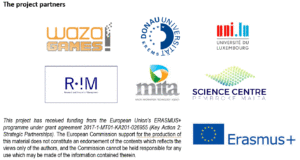The ERASMUS+ project ‘Create Digital Games for Education’ (CDG4E)
Digital games are increasingly drawing our students‘ attention outside the classroom. In addition, games are increasingly recognized as powerful tools to facilitate learning. In particular, games allow students to be at the heart of the learning experience, allow a trial and error approach, and make learning fun and engaging.
A strategic ERASMUS+ partnership
A strategic ERASMUS+ partnership between the Malta Information Technology Agency (MITA), the Science Centre (Department of Curriculum Management), waza! UG, the University of Luxembourg, the Danube Krems University, and Research and Innovation Management GmbH aims to challenge traditional pedagogies and encourage the use of innovative game-based learning methodologies for learning purposes. A first version of an easy-to-use educational game creation tool (Game Creator) has been developed to enrich the toolbox of teachers at local and European levels. The tool will allow both students and teachers to develop learning games and share them with the user community.
Two pilot educational games
Within the framework of the project two pilot educational games will be developed, one on the subject of Fake News and the other relating to the field of STEM learning (Science, Technology, Engineering & Mathematics). These two games will demonstrate the features and capabilities of a Game Creator.
Fake News and STEM game
Given the current impact of false news on social media and information portals, it is essential that the general public, especially young learners, know how to identify reliable sources of information. The STEM game will develop an inquiry-based learning approach, where students will develop skills in both the scientific process and critical thinking.
European partners from Malta, Austria, Germany and Luxembourg
A synergetic working relationship has been created between the European partners from Malta, Austria, Germany and Luxembourg, which will strengthen cooperation between higher education organisations and institutions and also facilitate the exchange, testing and development of inspiring practices in education.
The partnership aims to improve the level and quality of digital competences and the relevance of students‘ knowledge and skills and to promote student-centred learning approaches through ICT. Thus, the consortium seeks to create an innovative method of teaching and learning. The results of the project allow educators to diversify their pedagogies and students to learn using a modern and attractive tool, thus stimulating students‘ appetite to learn.

